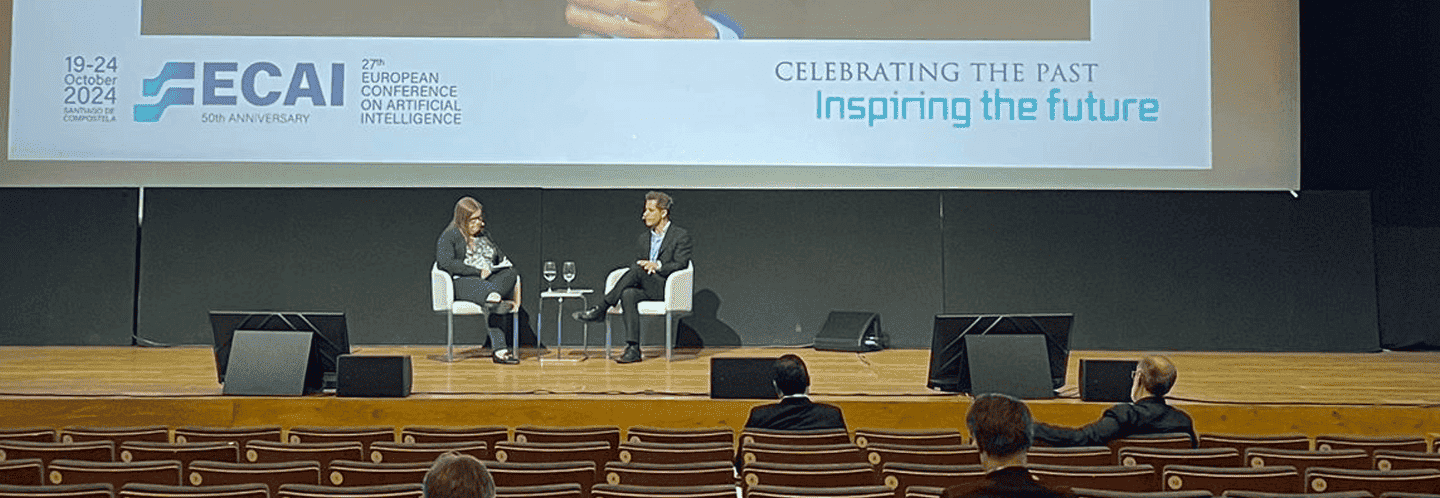
AI will require "creating higher-value work" capable of "better utilizing" technology
The economic revolution brought about by the development of Artificial Intelligence, similar to the one caused by the advent of electricity, will force changes in job profiles in the future, as professionals will be needed who are capable of generating 'greater value' and 'better utilizing technologies.'
The development of Artificial Intelligence (AI) will give rise to a new economy, a "revolution comparable to the one brought about by the advent of electricity or the invention of the printing press," and it will directly impact employment and the job profiles of future workers.
During a debate held at the European Conference on Artificial Intelligence (ECAI 2024), which is taking place from October 19 to 24 in Santiago de Compostela, American economist David H. Autor, professor in the Department of Economics at the prestigious Massachusetts Institute of Technology (MIT), stated that what will mark the "difference between jobs replaceable" by AI and those that are essential is the "experience that generates value."
In his speech during the panel on the Economic Impact of AI: Threats and Opportunities, Autor emphasized that the questions we should ask ourselves are whether we will use AI to "extend and empower experience or to devalue it and eliminate jobs." Therefore, he asserted that "if we want to extend the value of experience, we must invest in the opportunities that R&D in this field offers" and encouraged workers to "create higher-value work that is capable of better utilizing technology."
Hence, he warned that tasks "which are not automated, such as carpet making in India, are because it is cheap and precarious work for which the investment is not considered worthwhile." As he explained, AI has been "part of our daily lives for years, increasing the value of human experience, like a stethoscope," and making it possible for workers to have "extra capabilities to perform more specific tasks."
New Economy
For his part, Jeremy Rollison, Director of Government Affairs at Microsoft Corporation in the European Union (EU), pointed out that the development of AI has created a "new economy, comparable to the revolution brought about by the advent of electricity or the invention of the printing press." He warned that, in this new economic context, "new needs" arise, along with the demand for "new professions that have the ability to handle these tools."
In his opinion, "countries that are able to adapt more quickly to AI changes will have a competitive advantage and greater growth compared to others." As an example, he noted that given the high percentage of doctors in Spain who will retire in the next five years, "AI will not replace humans, but it can help professionals with medical diagnoses."
Jeremy Rollison also mentioned that "tasks that used to take us an hour, we can now do in ten minutes," but emphasized the need to "invest in these types of technologies so that everyone has access to them."
Future of AI
On the other hand, ECAI 2024 highlighted that the future of AI, from the perspective of scientific research, will depend on the ability to provide “practical answers for society, focused on the safety and trust of systems.” “Until now, efforts were not focused on these areas, which will help build safe Artificial Intelligence,” argued Iryna Gurevych, professor of Ubiquitous Knowledge Processing at the Department of Computer Science at the Technical University of Darmstadt in Germany.
For her part, Ann Nowé, from VU Brussels, emphasized that, in the future, advances in AI should be developed “following the rules of science, with results published to be contrasted and validated, and ultimately shared.” For Ann Nowé, “the challenges will focus on making systems work in practice and under an open system concept, allowing interaction with other agents.”
ECAI 2024
The European Conference on Artificial Intelligence (ECAI 2024), held from October 19 to 24 in Santiago de Compostela, brings together over 1,600 delegates who represent the global elite in Artificial Intelligence research. The event, sponsored by the European Association for Artificial Intelligence (EurAI), the Spanish Society for Artificial Intelligence (AEPIA), and organized by CiTIUS (Singular Research Center in Intelligent Technologies of the University of Santiago de Compostela - USC, co-funded by the European Union through the Galicia ERDF 2021–2027 programme) includes an extensive program featuring the presentation of the latest scientific results, conferences, panel discussions, workshops, and demonstrations to highlight the contribution of AI to societal development.
ECAI 2024, with the theme "Celebrating the Past. Inspiring the Future", marks the 50th anniversary of the first European AI conference held in Brighton in 1974. This is the second time the European Conference on Artificial Intelligence has been held in Santiago de Compostela, following the 2020 conference, which had to be converted into an online format due to the COVID pandemic, becoming a pioneering fully digital event worldwide.
This edition sets a new record, both in terms of the number of papers presented, which exceeds five hundred, and the number of attendees and the significance of its content. Without a doubt, all of this has made Santiago de Compostela the world capital of artificial intelligence during the week of October 19-24.